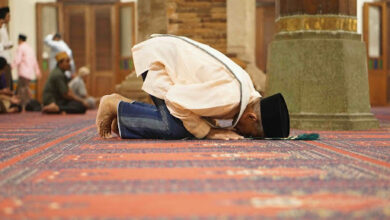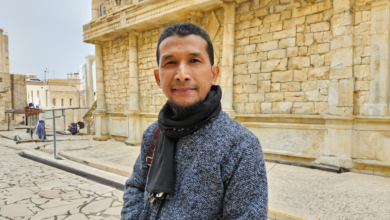
Conflict and Difference Management
Human nature
There are some negative human qualities, as God conveys in His Word. Among them:
- Qs 20:115. Often forgets and lacks determination.
لَقَدْ اِلٰٓى اٰدَمَ لُ لَمْ لَهٗ ا
- Qs 70:19-21. Frequent complaining and lots of excuses.
اِنَّ الْاِنْسَانَ لِقَ لُوْعًاۙ اِذَا الشَّرُّ اۙ اِذَا الْخَيْرُ اۙ
Moreover, women, usually:
- Act quickly and think about it later.
- Love to talk, regret later.
- Emotional, especially when jealous.
- Care about your appearance (gede prestige).
Get to know the scholars and khilafiyah
First, the scholars of interpretation (mufassirun). Tasks:
- Making rules for understanding the Qur'an (ulumul Qur'an)
- Make rules in interpreting alquran (the science of interpretation)
- Cleaning the interpretation of the Qur'an from the israiliyat story
Among them: Alqurtubi, Assuyuthi.
Second, scholars of hadith (muhadditsun). Tasks:
- Make rules to understand hadith (ulumul hadith).
- Giving a fatwa on the degree of each hadith (sohih, hasan & dhoif), not giving a fatwa on the law of fiqh practicing a hadith.
- Separating hadith from maudhu '(false hadith).
Among them: Bukhari, Muslim, Nasai, Abu Daud, Tirmidhi, and Ibn Majah.
Third, fiqh scholars (fuqoha). Tasks:
- Making rules for taking law from texts alquran and sunnah (suggestion of fiqh).
- Giving legal fatwas in practice (mandatory, sunnah, makruh).
- Separating masyru 'charities from bid'ah deeds.
Among them: Imam Malik, Imam Hanafi, Imam Shafi'i, and Imam Hanbali.
These three groups of scholars must have the same scientific competence in Alquran, the hadith of the Prophet, Arabic, and the rules of fiqh. Their difference is only from the division of their duties in society.
The history of the development of syar'i ulumusy
In the time of the Prophet , the Prophet's actions were used as a proof for taking the law of fiqh (the law of charity) which is not in the Qur'an. Thus, the sunnah of the Prophet is a popular proposition in Islam.
At the time of the Companions, with the development of Islam in various regions and the variety of characters and problems that existed, it affected the growth of the character of madrasas of fiqh (charity law) in various regions. For example:
- Madrasas of Mecca and Madrasas of Medina. The character of this madrasa is more inclined to ahlul hadith, not ro'yu (ijtihad), in dealing with and determining every problem that exists. From this madrasa education was born a high priest who is a hadith expert, namely Malik bin Anas (Imam Malik) and developed into a Malikiyah school of jurisprudence.
- Iraqi Madrasa. The character of this madrasa uses ro'yu more in solving existing problems, although this ijtihad does not conflict with the muhkamat hadith texts. From this madrasa was born a great mujtahid, namely Abu Hanifah and later developed into the Hanafi school of fiqh.
- The second century was born a great mujtahid who combined the madrasas of the Hijaz (Mecca and Medina) and the madrasas of Iraq, namely Imam Shafi'i.
- Among the students of Imam Shafi'I who later became more thick with his hadith was Ahmad bin Hanbal, then developed into Fiqh Hanabilah.
These 4 madrasas are known in the Kalam school as the Ahlu Sunnah wal Jama'ah school.
Muslim attitude
The attitude of Muslims in taking the law, as stated in Qs 4:59. Namely:
- The legal context of tsawabit (patent), such as halal-haram, pillars, conditions, and sunnah in the fiqh of worship, what is obligatory and what is prohibited, then the attitude taken is "sami'na wa atho'na". In this matter there is no realm for ijtihad in it.
- The legal context is mutaghoyyirot (subject to change), such as issues of procedure, strategy, facilities, and furu' problems. So it is returned to the ijtihad of the experts who we follow because of knowledge and belief.
Following one of these ijtihad agreements will save us from sin. Because every ijtihad, whether wrong or right, both get a reward.
Conflict is inevitable
Conflict is a dynamic of life. It is as described in the word of God and the hadith of the Prophet . Among them:
- 7:24-25. Enmity must have occurred since the Prophet Adam was revealed.
الَ اهْبِطُوْا لِبَعْضٍ لَكُمْ الْاَرْضِ اعٌ اِلٰى الَ ا ا ا
- 64:14. Domestic dispute test.
اَيُّهَا الَّذِيْنَ اٰمَنُوْٓا اِنَّ اَزْوَاجِكُمْ اَوْلَادِكُمْ ا لَّكُمْ احْذَرُوْهُمْۚ اِنْ ا ا ا اِنَّ اللّٰهَ
- The Messenger of Allah prayed, he stood well, was solemn, bowed and prostrated well, he said, "It is a prayer between love and fear. I asked Allah three things, He granted two things and prevented me one thing. I asked Him not to send any enemy against them other than them and attack them, He granted it. I asked Him not to send a disaster that destroyed them with a prolonged famine that caused hunger, He granted it. And I asked Him not to create divisions among themselves (internal conflicts between the Muslims), but unfortunately He refused. (Hadith narrated by Ahmad)
What is important then, we make sure that we carry out the mission that God has ordered. That is, as long as life must be a good person. This is according to His word:
- 22:77.
اَيُّهَا الَّذِيْنَ اٰمَنُوا ارْكَعُوْا اسْجُدُوْا اعْبُدُوْا وَافْعَلُوا الْخَيْرَ لَعَلَّكُمْ لِحُوْنَ
- 4:36
اعْبُدُوا اللّٰهَ لَا ا ا الْوَالِدَيْنِ اِحْسَانًا الْقُرْبٰى الْيَتٰمٰى الْمَسٰكِيْنِ الْجَارِ الْقُرْبٰى الْجَارِ الْجُنُبِ الصَّاحِبِ الْجَنْۢبِ ابْنِ ا ا الاّٰهَ الاّٰهَ
Is it enough to just feel like a good person? No! Turns out, there must be proof. That is:
- Neighbor testimony.
A man asked the Messenger of Allah : How do I know if I have done good or bad? Then the Prophet said, "If you hear your neighbor say you have done good, it means you have done good. If you hear them say you have done bad, then you have done bad." (Hadith narrated by Ahmad)
- Proof of purity of heart.
ابِصَةَ الَ : أَتَيْتُ لَ اللهِ – صَلَّى اللهُ لَيْهِ لَّمَ – الَ : (( لُ البِرِّ الإِثْمِ لل )) ا اكَ النَّفْسِ الصَّدْرِ اكَ النَّاسُ ))حَدِيْثٌ اهُ ” ” الإِمَامَيْنِ وَالدَّارميِّ ادٍ
"From Wabishah bin Ma'bad radhiyallahu 'anhu, he said: I came to the Messenger of Allah , then he said: Did you come to ask about virtue and sin? I answered: Yes. The Prophet said: Ask your heart for fatwa. Virtue is whatever the soul feels at ease with and the heart feels at ease with it, while sin is whatever is stuck in your heart and makes you doubt, even though people give you fatwas.”
- Proof of wise preaching and conquering hatred (Surah 41:31-33)
اَحْسَنُ لًا اِلَى اللّٰهِ لَ الِحًا الَ اِنَّنِيْ الْمُسْلِمِيْنَ لَا الْحَسَنَةُ لَا السَّيِّئَةُ اِدْفَعْ الَّتِيْ اَحْسَنُ اِذَ ا لا
"And who is better in speech than one who calls to Allah and does good and says: Indeed, I am of the Muslims (who have surrendered)? And it is not the same as good and evil. Reject (the evil) in a better way, so that the person with whom there is enmity between you and him will be like a loyal friend. And (the good qualities) will not be bestowed except to those who are patient and it is not granted except to those who have great fortune.”
- Strong evidence in the field of da'wah (Surah 4:146-147)
وكاين من نبي قتل معه ربيون كثير فما وهنوا لمآ اصابهم في سبيل الله وما ضعفوا وما استكانوا والله يحب الصبرين XNUMX وما كان قولهم الآ ان قالوا ربنا اغفر لنا ذنوبنا واسرافنا في امرنا وثبت اقدامنا وانصرنا على القوم الكفرين XNUMX فاتىهم الله ثواب الدنيا وحسن ثواب الاخرة اللّٰهُ الْمُحْسِنِيْنَ
“And how many prophets fought in battle accompanied by a large number of pious followers. They do not (become) weak because of the calamity that befell them in the way of Allah, do not become discouraged and do not (also) surrender (to the enemy). And Allah loves those who are patient. And their speech is nothing but a prayer: Our Lord, forgive our sins and our excessive actions (in) our affairs and establish our position, and help us against the disbelievers. So Allah gave them a reward in this world and a good reward in the hereafter. And Allah loves those who do good."
When conflict and differences are inevitable
Then, what about when conflicts and differences are unavoidable? Here are some tips for dealing with it:
- Not looking for who is wrong, but learning to be noble. As the word of Allah (Surah 3:134-135)
ال السَّرَّۤاءِ الضَّرَّۤاءِ الْكٰظِمِيْنَ الْغَيْظَ الْعَافِيْنَ النَّاسِۗ اللّٰهُ الْمُحْسِنِيْنَۚ الَّذِيْنَ اِذَا لُوْا احِشَةً الل لَمُوْٓا اَنْفُسَهُمْ ا اللّٰهَ ا ا
"(Namely) those who give infaq, both in time and in narrow times, and those who hold back their anger and forgive (mistakes) of others. And Allah loves those who do good. And (also) those who when doing heinous deeds or wrongdoing themselves, (immediately) remember Allah, then ask forgiveness for their sins, and who (again) can forgive sins other than Allah? And they do not continue the sinful act, while they know."
- Pray for them 70 times.
اَيُّهَا الَّذِيْنَ اٰمَنُوْٓا اِنَّ اَزْوَاجِكُمْ اَوْلَادِكُمْ ا لَّكُمْ احْذَرُوْهُمْۚ اِنْ ا ا ا اِنَّ اللّٰهَ
"O you who believe! Verily, among your wives and your children there are those who are enemies to you, so beware of them; and if you pardon and you forgive and forgive (them), then indeed, Allah is Forgiving, Most Merciful.”
The story of the Prophet every day istigfhar 70 times for the mistakes of the companions. As described in this hadith: Abdullah bin Umar bin Khaththab; a man came to the Messenger of Allah and said, "O Messenger of Allah, I have a slave who likes to do bad things and acts unjustly, can I beat him?" The Prophet replied, "Forgive him every day seventy times." (Hadith narrated by Ahmad)
- Conflict when dealing with tradition (Qur'an 7:199-200)
الْعَفْوَ الْعُرْفِ اَعْرِضْ الْجٰهِلِيْنَ اِمَّا الشَّيْطٰنِ اسْتَعِذْ اللّٰهِ اِنَّهٗ لِيْمٌ
"Be forgiving and tell people to do what is right, and don't care about stupid people. And if Satan comes to tempt you, then take refuge in Allah. Indeed, He is All-Hearing, All-Knowing."
- When the debate must be wise, not looking for the most correct. Like the following hadith: I heard Abu Darda say; Abu Bakr and Umar had an argument until Abu Bakr was angry with Umar. Umar turned away from him in anger. Then Abu Bakr went after him to apologize. But Umar did not forgive until he closed the door of his house in front of Abu Bakr. Abu Bakr then met the Prophet . Abu Darda said: at that time I was with the Messenger of Allah . Then the Messenger of Allah said: Surely this friend of yours has done good first. Abu Darda said; then Umar regretted what he had done. Then he came and said greetings and sat beside the Messenger of Allah , while telling the Messenger of Allah what he had done. Abu Darda said; Rasulullah was angry, until Abu Bakr said; By Allah, O Messenger of Allah, I am the one who has wronged. The Messenger of Allah said: Didn't you ever leave my best friend for me? Haven't you guys ever left my best friend for me? Indeed, I once said: O mankind, indeed I am a messenger to all of you, then you say: You have lied, but Abu Bakr said: You are right. (Hadith narrated by Bukhari)
When there is conflict in the household
Order when conflict occurs in the household, don't look for who is at fault, but forgive, embrace, and seek forgiveness. This is reflected in the word of God in QS. 64:14.
اَيُّهَا الَّذِيْنَ اٰمَنُوْٓا اِنَّ اَزْوَاجِكُمْ اَوْلَادِكُمْ ا لَّكُمْ احْذَرُوْهُمْۚ اِنْ ا ا ا اِنَّ اللّٰهَ
"O you who believe! Verily, among your wives and your children there are enemies to you, so beware of them; And if you forgive and forgive and embrace (them), then indeed, Allah is Forgiving, Most Merciful."
After being open-minded, then communicate (Surah 3:159).
ا اللّٰهِ لِنْتَ لَهُمْ لَوْ ا لِيْظَ الْقَلْبِ لَانْفَضُّوْا لِكَ اعْفُ اسْتَغْفِرْ لَهُمْ اوِرْهُمْ الْاَمْرِۚ اِذَا الل
"So by the grace of Allah you (Muhammad) were gentle with them. If you were harsh and harsh-hearted, they would have distanced themselves from those around you. Therefore forgive them and ask forgiveness for them, and consult with them in this matter. Then, when you have made up your mind, then put your trust in Allah. Indeed, Allah loves those who put their trust in him."
It is permissible to give punishments that have a deterrent effect for the agreed joint commitments (Qur'an 4:34).
الرجال قوامون على النساء بما فضل الله بعضهم على بعض وبمآ انفقوا من اموالهم فالصلحت قنتت حفظت للغيب بما حفظ الله والتي تخافون نشوزهن فعظوهن واهجروهن فى المضاجع واضربوهن فان اطعنكم فلا تبغوا عليهن سبيلا ان الله كان عليا كبيرا XNUMX
"Men (husbands) are protectors for women (wives), because Allah has favored some of them (men) over others (women), and because they (men) have provided a living from their wealth. So pious women are those who obey (to Allah) and take care of themselves when (her husband) is not around, because Allah has taken care of (them). The women you worry about nusyuz, you should advise them, leave them in bed (separate beds), and (if necessary) beat them. But if they obey you, then do not look for reasons to trouble them. Verily, Allah is Most High, Most Great."
If necessary, it is permissible for outside parties to intervene as a wise judge, not taking sides (Qs 4: 35).
اِنْ اقَ ا ابْعَثُوْا ا اَهْلِهٖ ا اَهْلِهَا اِنْ اِصْلَاحًا اللّٰهُ ا اِنَّ اللّٰهَ انَ لِيْمًا ا ٣٥
"And if you are worried that there will be a dispute between the two, then send a peacemaker from a male family and a peacemaker from a female family. If both (the peacemakers) intend to make improvements, surely Allah will give taufik to the husband and wife. Indeed, Allah is All-Aware, All-Knowing."
ا اغْفِرْ لَنَا لِاِخْوَانِنَا الَّذِيْنَ ا الْاِيْمَانِ لَا لْ لُوْبِنَا لًّا لِّلَّذِيْنَ اٰمَنُوْا اِنَّكَ رَّحِيْمٌ ࣖ
Delivered by Ustadzah Nur Hamidah Lc., M.Ag., during the Halaqoh online study Tuesday for Female Expatriates, October 5, 2021. [DDHKNews]



